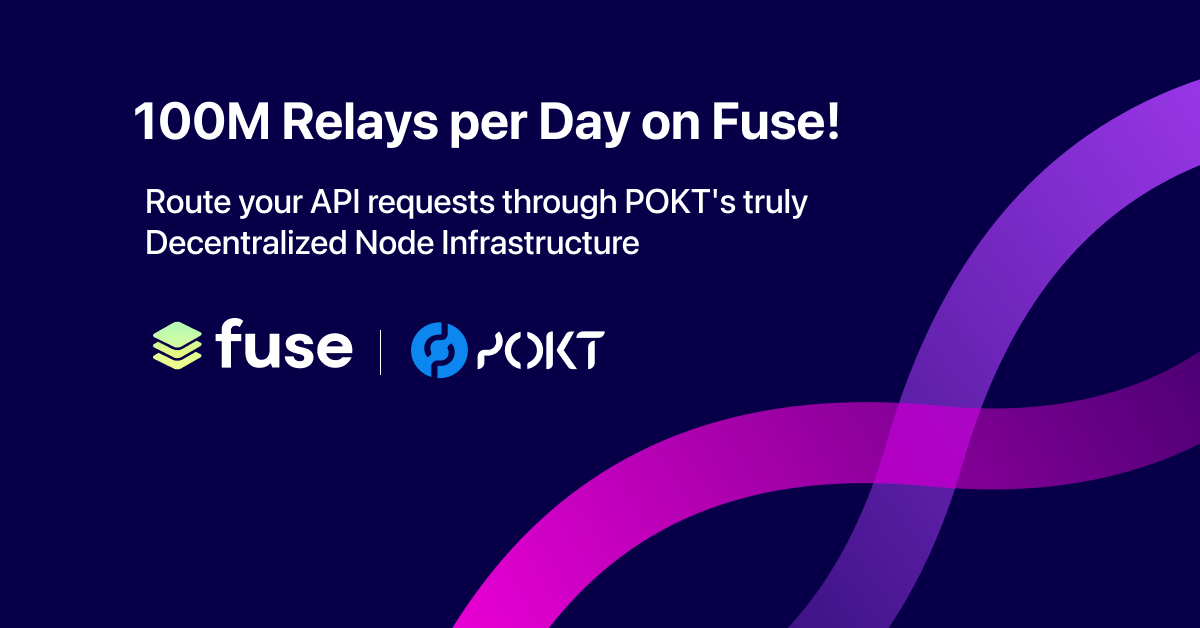When people talk about decentralization in the crypto space, they often invoke the number of validator nodes or full nodes of various blockchain networks. However, while this aspect is undoubtedly important, it is not sufficient to have decentralization at the blockchain node level.
Another area where decentralization is critical involves user interaction with the blockchain. When a user wishes to send a transaction or query a blockchain, they usually need to send a connection request to an RPC endpoint maintained by a full node or nodes on that blockchain.
Suppose RPC access is excessively centralized and only maintained by a few entities. In that case, the ability of users to interact with blockchains can be compromised or even totally denied by an attacker or centralized provider error or misbehavior, even though the blockchain network remains fully operational.
One project that strives to resolve this issue — with whom Fuse has had a very fruitful partnership — is Pocket Network.
What’s in the Pocket?
Pocket Network (Pocket) is a community (DAO)-governed project that strives to solve the RPC access decentralization problem by creating a technology stack and cryptoeconomic system enabling and incentivizing Pocket node operators to run full nodes on the Pocket-supported blockchains and relay RPC requests.
The Pocket Network blockchain ensures that Pocket nodes can prove (via validation) that they have duly processed a certain number of RPC relays over a certain time frame. Pocket nodes stake the platform’s native POKT token to ensure desirable behavior on their part. They also receive rewards for providing a quality service of data relays.
A project on one of the Pocket-supported blockchains can enable its decentralized application (dApp) users to access the blockchain’s RPC through Pocket by creating and using its endpoint in the Pocket Portal.
Pocket’s Impressive Growth
Since its launch, Pocket Network has seen massive growth in usage on a range of supported chains. Recently, the platform has completed a significant milestone of 1 billion daily relays. For comparison, in March 2021, that figure stood at only 2.1 million. According to the July data, Pocket has kept up the speed, averaging around 1 billion daily relays.
According to POKTscan, the platform’s unstoppable decentralized public RPC access infrastructure is currently powered by more than 32,000 nodes on supported chains. Pocket boosts blockchain connectivity for users of around 2,300 apps across dozens of supported chains.
Recently, Pocket’s growing stature has been bolstered by partnering with one of the largest multi-chain crypto projects, the Aave decentralized finance platform, with Aave making Pocket one of the main RPC access providers for its users and ecosystem dApps. Meanwhile, Pocket DAO passed two important proposals to improve protocol participants’ incentives and boost network efficiency.
Fuse and Pocket
The Fuse team recognized Pocket’s potential and the imperative for decentralized RPC access very early on. After finalizing its partnership with Pocket, the Fuse Network blockchain became one of the first public blockchains to be officially supported by Pocket’s infrastructure. It served an essential function as a live testing ground for the Pocket technology.
Fuse Foundation also arranged a FUSE-POKT token swap with Pocket DAO in order to secure a public RPC endpoint freely available to Fuse users and dApps. This recently allowed them to achieve the all-time high of more than 100 million daily RPC connections to Fuse Network via Pocket.
Projects in the Fuse ecosystem are also encouraged to further enhance their users’ ability to interact with the Fuse Network blockchain by obtaining their own additional RPC endpoints from Pocket through the Pocket Portal .
We at the Fuse team are excited by the Pocket platform’s rapid growth and maturation, and we look forward to continuing to develop our partnership and synergies together.
.svg)
.svg)











